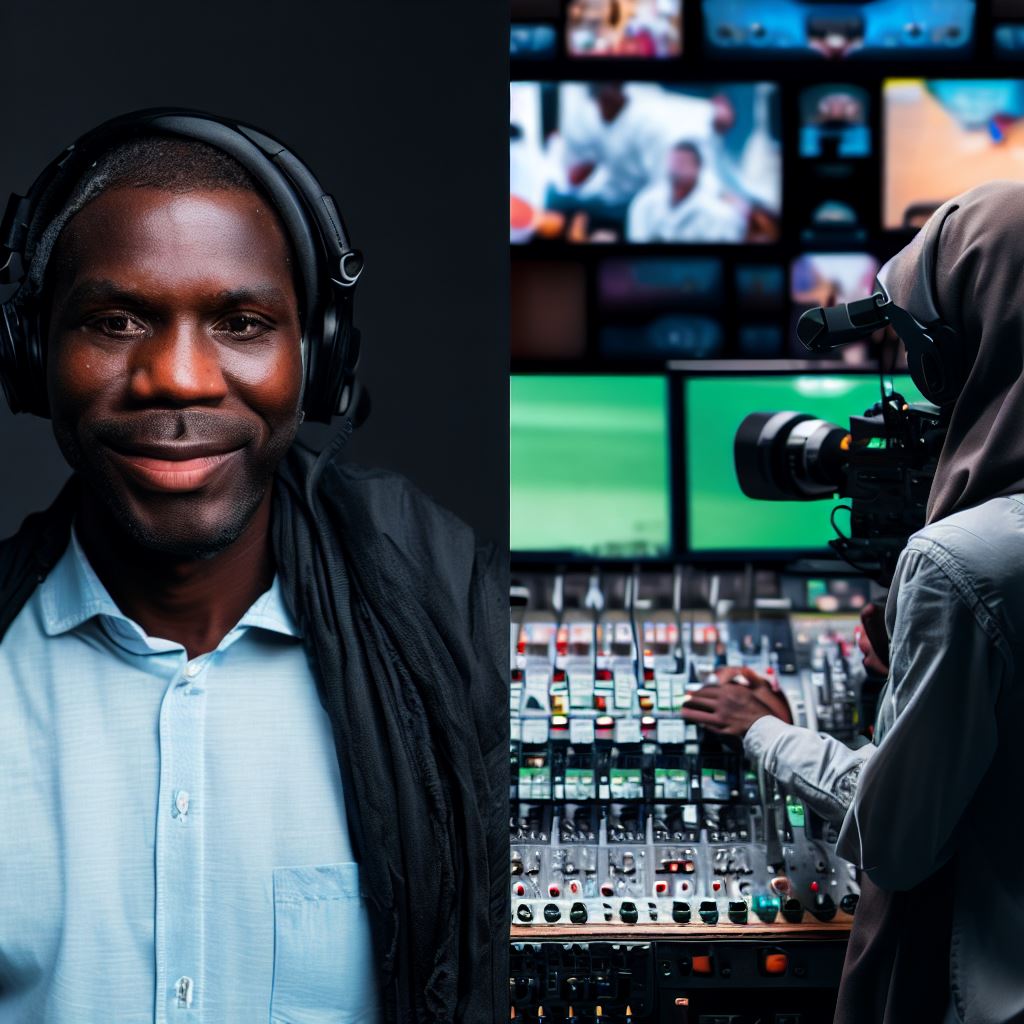Introduction
Let’s explore Nigeria radio sports production: trends & insights.
Nigeria’s sports industry plays a significant role in the nation’s culture and economy.
Radio has emerged as a dominant medium for sports production, offering live coverage, commentary, and analysis.
Understanding trends and insights in radio sports production is crucial for industry professionals to stay relevant and meet the demands of the audience.
As technology advances and audience preferences shift, radio producers need to keep up with the latest developments and adapt their strategies accordingly.
This blog section will explore key trends and insights in Nigeria’s radio sports production, highlighting the challenges and opportunities that arise in this dynamic industry.
By examining the use of digital platforms, increasing fan engagement, and embracing innovative production techniques, radio professionals can create compelling content that resonates with the audience and enhances the overall sports experience.
Through a combination of research, analysis, and practical examples, this section aims to provide valuable insights into some trends and practical advice for radio sports production in Nigeria.
It is essential for professionals in the industry to stay informed and attentive to evolving trends, as this will ultimately shape the future of radio sports production in Nigeria.
Historical Overview of Radio Sports Production in Nigeria
In this section, we will explore the evolution of radio sports production in Nigeria, major milestones and key figures in its development, and the impact of radio in popularizing sports in the country.
Evolution of Radio Sports Production in Nigeria
Radio sports production in Nigeria has had an interesting journey, starting from its early days to the present.
In the 1950s, radio sports coverage mainly focused on football, which was and remains the most popular sport in the country.
Initially, radio sports production was limited in terms of technical capabilities and resources.
Commentators had to rely on basic equipment and often painted vivid pictures of matches using their descriptions.
Despite the limitations, radio became a vital medium for Nigerians to follow and engage with sports.
Over the years, radio sports production has evolved alongside technological advancements.
The introduction of digital recording, satellite broadcasting, and live streaming has revolutionized the way radio covers sports in Nigeria.
This evolution has led to more immersive and engaging experiences for listeners.
Major Milestones and Key Figures in the Development of Radio Sports Production
Several milestones and key figures have played significant roles in shaping radio sports production in Nigeria.
One crucial milestone was the establishment of the Federal Radio Corporation of Nigeria (FRCN) in 1933, which provided a platform for sports coverage on a national scale.
In the 1960s, Ernest Okonkwo emerged as a pioneering figure in radio sports production.
He became the first iconic voice of Nigerian radio sports commentary and popularized the medium through his captivating style and insightful analysis.
Another milestone came in the 1990s when more private radio stations were licensed, increasing the diversity and competition in the Nigerian radio sports production landscape.
This led to a rise in the quality and variety of sports programming available to listeners.
In recent years, radio sports production has witnessed the emergence of new talents, such as Tega Onojaife and Kate Obodo, who have brought a fresh perspective and unique voices to the industry.
Impact of Radio on Popularizing Sports in Nigeria
Radio has played a crucial role in popularizing sports in Nigeria.
It has provided a platform for remote communities to connect with major sporting events happening across the country.
Radio’s accessibility has made it possible for everyone, regardless of their socio-economic background, to be part of the sporting conversation.
The extensive coverage of football matches, including live commentaries and post-match analysis, has helped build a passionate fan base for local and international football teams.
Additionally, radio sports talk shows and phone-in programs have created interactive platforms for listeners to discuss and debate sports-related topics.
The impact of radio in popularizing sports goes beyond football. It has also provided coverage for sports such as athletics, boxing, basketball, and cricket, among others.
By showcasing a diverse range of sports, radio has contributed to the growth and development of various sporting disciplines in Nigeria.
In short, the historical overview of radio sports production in Nigeria highlights its evolution, major milestones, key figures, and impact on popularizing sports.
From humble beginnings to the present, radio remains a powerful medium that continues to captivate and engage Nigerian sports enthusiasts.
Read: Teaching Traditional Games: A PE Instructor in Nigeria
Current Landscape of Radio Sports Production in Nigeria
Overview of the radio sports production industry in present times
Radio sports production in Nigeria has undergone significant growth and development in recent years.
With the advancement in technology and the increasing popularity of sports, radio stations have dedicated resources and time to cover sporting events comprehensively.
These productions are characterized by dynamic commentary, expert analysis, and engaging discussions to keep listeners informed and entertained.
Furthermore, radio sports production has evolved to incorporate elements such as live interviews, call-in segments, and social media interactions to enhance audience engagement.
The current landscape of radio sports production in Nigeria is vibrant and competitive, with various stations vying for audience attention and loyalty.
Analysis of the popular sports covered by radio in Nigeria
Football is undoubtedly the most popular sport covered by radio stations in Nigeria.
The Nigerian audience has a deep passion for football, both locally and internationally, making it an obvious choice for comprehensive coverage.
Radio stations provide live commentary, pre and post-match analysis, interviews, and updates on various football leagues, including the Nigerian Professional Football League and major European leagues like the English Premier League and La Liga.
In addition to football, radio sports production in Nigeria also covers other sports such as basketball, athletics, boxing, and tennis.
These sports receive significant coverage, especially during major tournaments and events, and attract a dedicated fan base that tunes in to listen to updates and expert opinions.
Prominence of local sports coverage compared to international sports
While international sports receive significant coverage on Nigerian radio, local sports also hold a prominent place in radio sports production.
Nigerians have a strong affinity for their local sports, particularly football, and radio stations cater to this demand by providing extensive coverage.
Local football leagues, such as the Nigerian Professional Football League, are broadcasted live on various radio stations, allowing fans to follow the matches closely.
Radio sports production also focuses on promoting and nurturing local talents by showcasing grassroots sports, school competitions, and youth tournaments.
This emphasis on local sports coverage not only boosts the morale of Nigerian athletes but also creates a sense of national pride and unity among listeners.
Furthermore, radio sports production plays a crucial role in promoting lesser-known sports and athletes, helping to diversify the sporting landscape in Nigeria.
Read: Becoming a Radio Sports Producer in Nigeria: A Guide
Technological Advances in Radio Sports Production in Nigeria
Technological advancements have had a significant impact on radio sports production in Nigeria.
This section explores the various advancements that have influenced the industry and analyzes how they have enhanced audience engagement.
Exploration of Technological Advancements
Over the years, radio sports production in Nigeria has witnessed the influence of various technological advancements.
These include:
- Improved broadcasting equipment.
- Enhanced audio editing software.
- High-quality microphones and recording devices.
- Advanced transmission systems.
These advancements have revolutionized the way sports events are covered and broadcasted on the radio.
Incorporation of Live Streaming, Mobile Apps, and Social Media Platforms
With the rise of digital media, radio sports production in Nigeria has embraced new platforms such as live streaming, mobile apps, and social media.
These platforms have expanded the reach of radio sports beyond traditional radio frequencies.
Live streaming has allowed fans to listen to their favorite sports programs in real-time, even if they are not within the range of radio frequencies.
Mobile apps have made it possible for listeners to access sports content on their smartphones, providing convenience and flexibility.
Additionally, social media platforms have become essential tools for radio stations to engage with their audience and share sports-related updates and content.
Enhanced Audience Engagement
The technological advancements in radio sports production have significantly enhanced audience engagement.
The incorporation of live streaming has allowed fans to follow their favorite teams and athletes seamlessly, fostering a sense of connection and participation.
Moreover, mobile apps have provided listeners with personalized experiences, allowing them to select their preferred sports programs and receive notifications about upcoming matches or events.
This tailored approach has increased audience loyalty and satisfaction. Social media platforms have also played a crucial role in engaging the audience.
Radio stations can interact with listeners through comments, polls, and live chats.
This two-way communication has made the audience feel more involved and valued, creating a sense of community among sports enthusiasts.
The technological advances in radio sports production in Nigeria have transformed the industry.
Improved broadcasting equipment, live streaming, mobile apps, and social media platforms have revolutionized the way sports events are covered and consumed.
These advancements have not only expanded the reach of radio sports but have also enhanced audience engagement.
Fans can now listen to their favorite sports programs from anywhere, receive personalized content, and actively participate through social media interactions.
The future of radio sports production in Nigeria looks promising, with continuous advancements in technology expected to provide even more immersive and interactive experiences for sports fans.
Read: Roles & Duties of a Radio Sports Producer in Nigeria
Content Strategies and Trends in Radio Sports Production
In this section, we will delve into the various content strategies and trends that radio stations in Nigeria employ to engage their listeners in sports production.
These strategies have evolved over time to ensure captivating and informative broadcasts.
Examination of Content Strategies
Radio stations utilize various content strategies to captivate and engage their listeners during sports broadcasts.
These strategies include providing live updates, pre-match analysis, post-match analysis, and expert opinions.
Radio stations often invite renowned sports personalities and analysts to provide insightful commentary.
By employing content strategies that resonate with their audience, radio stations achieve higher listener engagement.
Increasing Focus on Analysis, Commentary, and Opinion-Based Programs
Radio stations have noticed the growing demand for in-depth analysis, expert commentary, and opinion-based programs.
Listeners want more than just live scores; they crave insightful discussions and interpretations of the game.
Radio stations have started incorporating dedicated time slots for detailed analysis and post-match discussions.
These programs allow fans to gain a deeper understanding of the sport and enhance their overall experience.
Trends in Radio Sports Production
Radio sports production has experienced several trends aimed at keeping listeners engaged and entertained.
One trend is the incorporation of fan interaction, where listeners can call in or send messages with their opinions.
This interaction creates a sense of community and allows fans to actively participate in the discussion.
Radio stations also host live events, such as fan meet-ups or viewing parties, to further connect with their audience.
These events provide opportunities for fans to engage in sports-related conversations with like-minded individuals.
In general, radio stations in Nigeria have implemented various content strategies and followed emerging trends to enhance their sports production.
By incorporating analysis, commentary, and opinion-based programs, they cater to the audience’s desire for insightful discussions.
Additionally, the inclusion of fan interaction and live events strengthens the bond between the radio stations and their listeners.
With these strategies and trends, radio sports production in Nigeria continues to evolve and provide an engaging experience for sports enthusiasts.
Read: Building a Portfolio: Radio Sports Producers in Nigeria

Challenges and Opportunities in Nigerian Radio Sports Production
In Nigerian radio sports production, various challenges hinder the effective creation of sports content.
However, there are also numerous opportunities for growth and improvement in this field.
Additionally, the emergence of technologies and partnerships provide radio stations with avenues to leverage and enhance their sports production.
Challenges Faced by Radio Stations in Producing Sports Content
- Limited resources pose a significant challenge to radio stations in producing quality sports content.
- A lack of funding inhibits the ability to invest in modern equipment and infrastructure upgrades.
- Inadequate training and skill development among radio sportscasters affect the quality of production.
- Time constraints make it difficult to cover and produce comprehensive sports content on radio.
- Poor infrastructure and unreliable power supply can disrupt live sports broadcasts and affect production.
Opportunities for Growth and Improvement in Radio Sports Production
- Increasing listenership offers an opportunity for radio stations to attract sponsors and advertisers.
- Diversifying sports content to include local and grassroots sports can help capture a wider audience.
- Enhancing the quality of sports analysis through improved research and expert insights.
- Introducing interactive platforms such as call-ins and online discussions can engage listeners.
- Collaborating with sports organizations and associations can provide access to exclusive content and interviews.
How Radio Stations Can Leverage Emerging Technologies and Partnerships
- Utilizing digital platforms enables radio stations to reach a global audience and expand their listener base.
- Integrating social media channels allows for increased interaction and engagement with sports fans.
- Investing in live-streaming capabilities enables radio stations to broadcast sports events in real-time.
- Forming partnerships with sports betting companies can provide additional revenue streams.
- Exploring podcasting and on-demand content helps radio stations cater to the preferences of the modern audience.
In review, Nigerian radio sports production faces challenges such as limited resources, funding constraints, and training gaps.
However, the industry also holds opportunities for growth through increased listenership, diversification of sports content, and collaboration with sports organizations.
Additionally, leveraging emerging technologies and forming strategic partnerships can revolutionize radio sports production in Nigeria.
By embracing these opportunities, radio stations can overcome challenges and deliver high-quality sports content to their audience.
Insights for Radio Stations and Sports Content Producers
Summarization of key insights and takeaways from the blog post
- Nigeria’s radio sports production has witnessed significant growth and evolution over the years.
- The emergence of digital platforms and social media has revolutionized sports content consumption.
- Radio stations and sports content producers need to understand the changing dynamics and adapt accordingly.
- Quality storytelling and engaging content are crucial for attracting and retaining listeners.
- Utilizing a multi-platform approach allows for broader audience reach and engagement.
- Collaborations with sports clubs, athletes, and influencers can enhance the credibility and popularity of radio sports production.
Recommendations for radio stations and sports content producers to stay relevant
- Stay updated with the latest trends in sports content and radio broadcasting.
- Invest in technology and training to improve production quality and efficiency.
- Embrace digital platforms and social media to amplify reach and engagement.
- Create a strong online presence by regularly updating websites and social media pages with relevant sports content.
- Encourage listener participation through interactive segments, contests, and interviews with sports personalities.
- Collaborate with sports clubs, leagues, and athletes to create exclusive content and build brand partnerships.
Importance of continuous adaptation and innovation in radio sports production
- The sports media landscape is constantly evolving, and radio stations must keep pace with the changing dynamics.
- Embracing new technologies and platforms helps radio stations stay relevant and capture a larger market share.
- Innovation in content creation and storytelling techniques keeps listeners engaged and interested.
- Adapting to the preferences and interests of the target audience ensures higher listenership and loyalty.
- Continuous adaptation and innovation allow radio stations to be proactive in catering to the evolving needs of sports fans.
- Successful radio sports production requires a balance between tradition and innovation to maintain credibility and relevance.
In brief, Nigeria’s radio sports production is witnessing a transformative phase with the advent of digital platforms and changing audience preferences.
Radio stations and sports content producers must understand the importance of adapting and innovating to stay relevant in this competitive landscape.
By embracing new technologies, creating engaging content, and collaborating with sports entities, they can attract and retain a larger audience.
Continuous adaptation and innovation will be key in ensuring long-term success in radio sports production.
Discover More: Nigeria’s Gym Culture: A Coach’s Perspective
See Related Content: A Day in the Life of a Nigerian Athletic Director
Conclusion
This blog post has highlighted the main trends and insights in Nigeria’s radio sports production.
We have discussed various aspects such as the increasing popularity of sports radio shows, the use of technology in enhancing production quality, and the shift towards interactive and engaging content.
Radio sports production in Nigeria has witnessed significant growth and development in recent years.
The increasing demand for sports content and the rise of sports radio shows have provided great opportunities for broadcasters and producers.
The use of advanced technology has also allowed for better sound quality, exciting commentary, and live coverage of sporting events.
Furthermore, the shift towards interactive and engaging content has allowed listeners to actively participate in discussions and express their opinions.
This has not only made radio sports production more dynamic but also strengthened the connection between broadcasters and their audience.
Looking ahead, the future prospects of radio sports production in Nigeria seem promising.
With a growing sports culture and the increasing availability of sports content, there is a great potential for further growth in this industry.
As technology continues to advance, we can expect even more innovative and immersive radio sports experiences.
In a nutshell, Nigeria’s radio sports production is on a positive trajectory and holds immense possibilities for the future.
As broadcasters and producers adapt to changing trends and leverage new technologies, we can expect radio sports production in Nigeria to continue thriving and entertaining sports fans across the nation.




